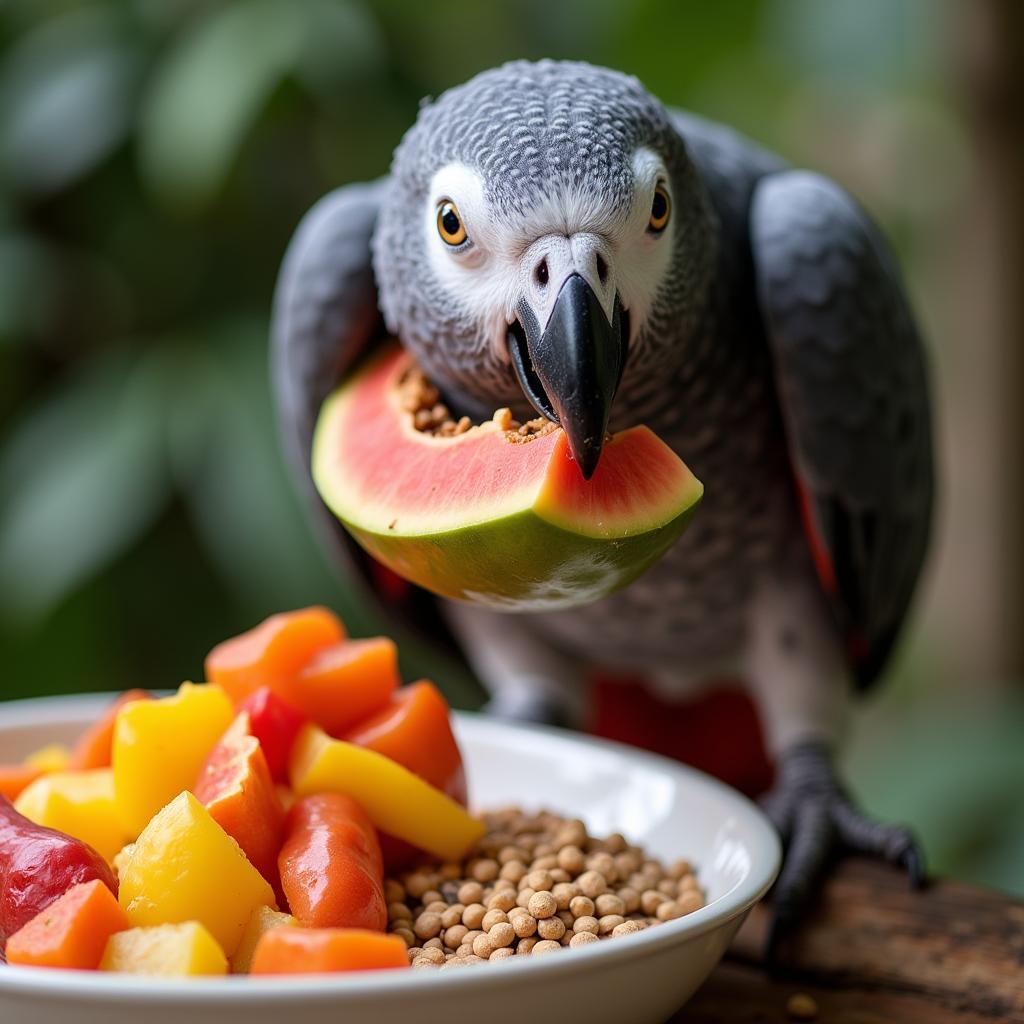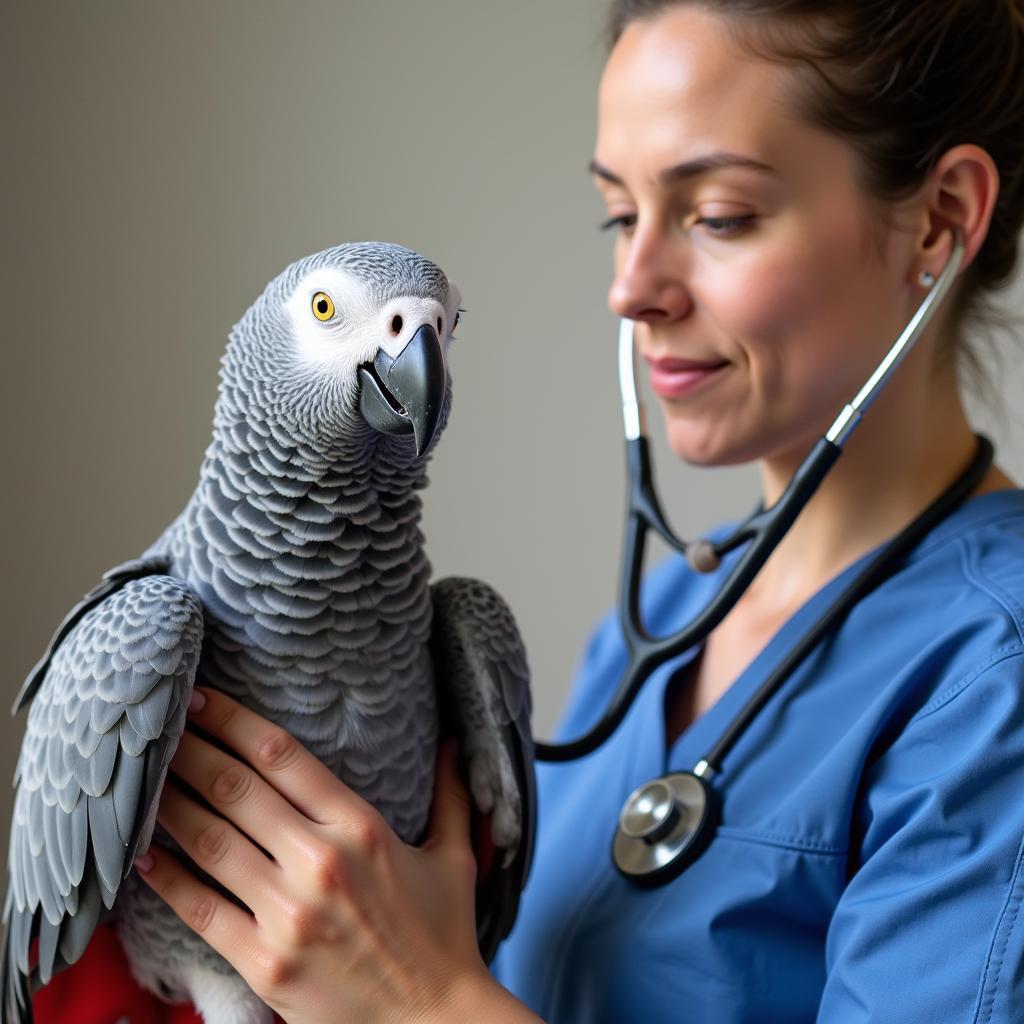African Grey Parrot Nutritional Requirements: A Complete Guide
African grey parrots, renowned for their intelligence and ability to mimic human speech, are beloved companions. But caring for these intelligent birds goes beyond providing a spacious cage and engaging toys. A crucial aspect of their well-being lies in understanding their specific nutritional requirements. Meeting these needs ensures your feathered friend enjoys a long, healthy, and vibrant life.
Beyond Seeds: Understanding a Balanced Diet for African Greys
While seeds might seem like the go-to food for parrots, an all-seed diet can lead to nutritional deficiencies. In the wild, African greys enjoy a diverse diet rich in fruits, vegetables, nuts, and occasional protein sources. Replicating this variety in captivity is key to their health.
Essential Components of an African Grey’s Diet
- High-Quality Pellets: Formulated to meet a significant portion of your parrot’s nutritional needs, pellets should comprise 60-70% of their daily intake. Look for brands specifically designed for African greys.
- Fresh Fruits and Vegetables: Aim for a colorful variety, offering 20-30% of their diet as fresh produce. Leafy greens, berries, melons, and vegetables like carrots, broccoli, and sweet potatoes are all excellent choices.
- Healthy Fats: Nuts and seeds, while not the mainstay of their diet, provide essential fatty acids. Offer these in moderation as treats or incorporate them into foraging toys for mental stimulation.
- Cooked Foods: Occasionally offering small portions of cooked beans, rice, or lean chicken can provide additional protein and variety.
 African Grey Parrot Enjoying a Healthy Meal
African Grey Parrot Enjoying a Healthy Meal
Toxic Foods: What to Avoid Feeding Your African Grey
Just as important as providing nutritious food is avoiding harmful ones. Certain foods can be toxic to African greys and should never be offered:
- Avocado: All parts of the avocado plant contain persin, a toxin that can cause respiratory distress and even death in parrots.
- Chocolate: Theobromine in chocolate is toxic to parrots, affecting their central nervous system and heart.
- Caffeine: Found in coffee, tea, and some sodas, caffeine can cause hyperactivity, increased heart rate, and even seizures in parrots.
- Alcohol: Alcohol is highly toxic to birds, affecting their liver and nervous system.
- Salty or Sugary Foods: Processed foods high in salt, sugar, or artificial additives offer no nutritional value and can lead to health problems in the long run.
Water: The Elixir of Life
Fresh, clean water is crucial for your African grey’s survival. Ensure their water dish is cleaned daily and refill it with fresh water at least twice a day.
Nutritional Deficiencies: Signs and Solutions
Even with a well-balanced diet, nutritional deficiencies can occur. Watch for these signs:
- Feather Plucking: While often a sign of boredom or stress, feather plucking can also indicate a deficiency in essential vitamins and minerals.
- Loss of Appetite: Sudden changes in appetite can be a red flag.
- Lethargy: A normally active parrot that becomes unusually quiet or lethargic might be experiencing a health issue, including nutritional deficiencies.
If you notice any of these signs, consult an avian veterinarian immediately.
 Avian Vet Checking an African Grey Parrot
Avian Vet Checking an African Grey Parrot
Tips for Successful Feeding
- Introduce New Foods Gradually: Offer new fruits, vegetables, or pellets alongside familiar foods to encourage acceptance.
- Make Mealtimes Fun: Use foraging toys to hide food and stimulate your parrot’s natural foraging instincts.
- Monitor Food Intake: Observe how much your parrot eats to adjust portions and ensure they are receiving adequate nutrition.
Frequently Asked Questions
Q: Can African greys eat peanuts?
A: Yes, African greys can eat peanuts in moderation. Unsalted peanuts in the shell provide mental stimulation and a healthy source of fat.
Q: How much should I feed my African grey parrot daily?
A: The amount of food varies based on the parrot’s age, activity level, and metabolism. A general guideline is 1/4 to 1/2 cup of parrot food mix daily, supplemented with fresh fruits and vegetables.
Q: Can African greys eat bananas?
A: Yes, bananas are a safe and healthy treat for African greys. They are a good source of potassium, vitamin C, and fiber.
Q: What kind of pellets are best for African grey parrots?
A: Look for high-quality pellets specifically formulated for African greys. Choose brands with minimal artificial colors, flavors, and preservatives.
Q: My African grey is a picky eater. What can I do?
A: Patience is key. Continue offering a variety of healthy foods, even if your parrot is initially resistant. Try different textures and presentations to entice them.
Need More Help?
Do you have more questions about your African grey parrot treatment? Perhaps you are considering getting an African grey parrot book? Or maybe you want to know the differences between an African grey parrot vs macaw?
For all your African grey needs and concerns, we are here to help!
Contact us:
Phone Number: +255768904061
Email: [email protected]
Address: Mbarali DC Mawindi, Kangaga, Tanzania
We have a 24/7 customer support team ready to assist you.

